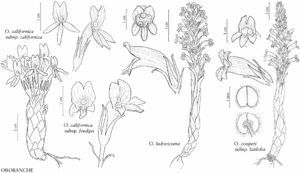Orobanche californica subsp. feudgei
Madroño 22: 62. 1973.
Plants usually simple proximally, 10–30 (–40) cm, portion proximal to inflorescence (6–) 10–18 cm, stout. Inflorescences corymbs, sometimes subcorymbose or subcapitate racemes, sometimes racemose, 4–12 cm; bracts pallid to pinkish tinged, drying brown. Pedicels 5–15 (–20) mm. Calyces 16–22 mm, lobes pallid, sometimes tinged with reddish purple or reddish-brown, linear-subulate, (12–) 15–20 mm. Corollas pallid or yellow distally, sometimes pinkish tinged, often with darker veins, 25–35 mm; tube broad, gradually widening toward throat; throat 8–10 mm wide; lips (8–) 10–12 mm, abaxial lobes narrowly oblong, 5–7 mm wide, apex subacute or obtuse, sometimes shallowly retuse, adaxial lobes broadly oblong and rounded, apex sometimes emarginate or shallowly retuse. 2n = 48.
Phenology: Flowering May–Jul.
Habitat: Washes, open sagebrush flats and slopes.
Elevation: 800–2600 m.
Distribution
Calif., Mexico (Baja California)
Discussion
Subspecies feudgei occurs from the Piute Mountains of Kern County and the vicinity of Mount Pinos in Ventura County, California, south to the Sierra San Pedro Mártir in Baja California.
Subspecies feudgei is apparently host-specific on Artemisia tridentata (Asteraceae).
Plants with the morphological features defining subsp. feudgei correlate fairly well with a distinct ecology and geography. The geographical area occupied by subsp. feudgei coincides with the southeastern portion of the range of Orobanche californica.
L. R. Heckard (1973) noted the morphological similarities of subsp. feudgei to Orobanche corymbosa.
Selected References
None.
